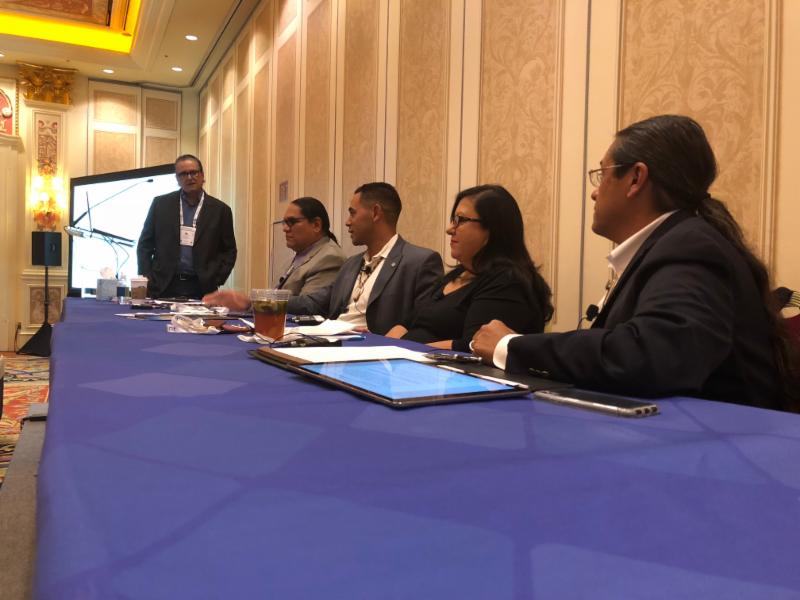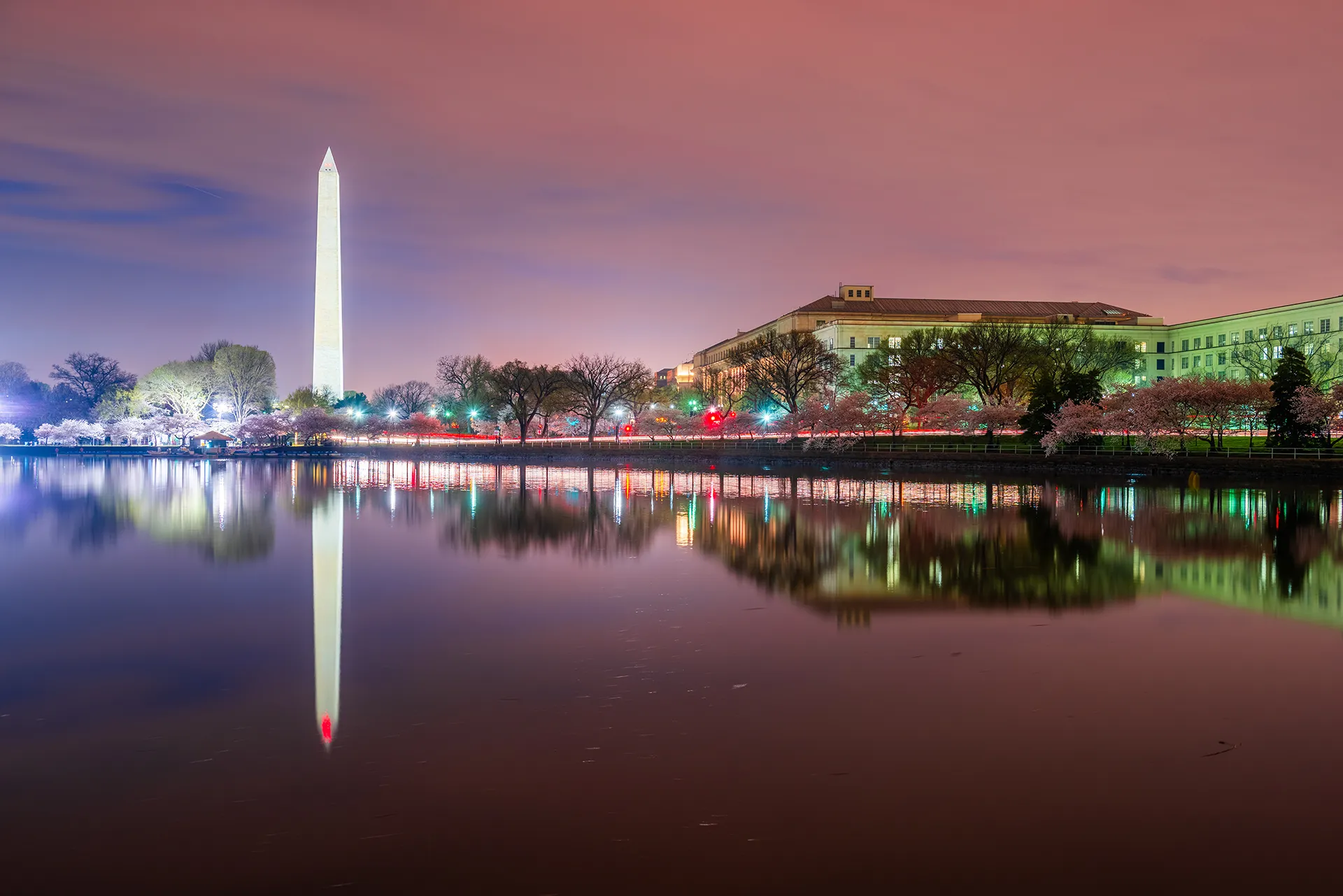October 11, 2018

The G2E 2018 “Tribal Leadership Roundtable: The Indian Gaming Regulatory Act in the 21st Century,” panel. In the photo L-R Victor Rocha, Ernie Stevens, Jr., Chairman of the National Indian Gaming Association, Rodney Butler, Chairman of the Mashantucket Pequot Tribe, Melanie Benjamin, Chief Executive of the Mille Lacs Band of Ojibwe and Mark Macarro, Chairman, Pechanga Band of Luiseño Indians.
Las Vegas, Nevada – October 08, 2018 – Global Gaming Expo (G2E) 2018 officially kicked off their annual show on Monday, at the Sands Expo with a full day of panels and educational workshops which included a track focusing on Indian gaming related topics and issues. Indian gaming representative and industry experts presented to the G2E attendees.
Starting off the 2018 edition of the tribal gaming tracks brought together tribal leaders to discuss the 30 years of gaming regulation under the Indian Gaming Regulatory Act (IGRA.) The panel entitled “Tribal Leadership Roundtable: The Indian Gaming Regulatory Act in the 21st Century,” was moderated by Victor Rocha, President of Victor Strategies and included leaders such as Mark Macarro, Chairman, Pechanga Band of Luiseño Indians, Melanie Benjamin, Chief Executive of the Mille Lacs Band of Ojibwe Indians, Rodney Butler, Chairman of the Mashantucket Pequot Tribe and Ernie Stevens, Jr., Chairman of the National Indian Gaming Association.
The landmark 1987 Supreme Court decision under Cabazon paved the way for the Indian Gaming Regulatory Act (IGRA), ultimately leading to a dynamic of change in the economic development atmosphere in Indian country. When the 100th United States Congress enacted IGRA in 1988, nobody could have predicted the tremendous success tribal gaming is currently enjoying.
In this session, tribal leaders discussed the ever-growing tribal gaming industry and the regulatory framework of IGRA, which some see as potentially outdated given today’s landscape, especially concerning mobile gaming and sports betting.
Chairman Macarro said, “IGRA is fundamentally important to everything we do. It’s the pillar and foundation.” He added, “In so far as looking at changes in our market we need to ask, Is this a threat for us? Does it harm our brick and mortar or do we incorporate it into our brick and mortar for our people, for our tribes and the future? This one is difficult because things are moving so quickly, there is so much in society that has changed since IGRA was passed. With the onset of a mobile society, it is something we need to be proactive about.”
Macarro also indicated that it is important to take stock of how sports betting can appear in all its variations, including different states and jurisdictions including Indian country.
Chief Executive Benjamin was asked about what sports betting means to the Minnesota tribes. She said, “There is a lot of discussion going on regarding sports betting, but until the legislature makes a move we’ll know exactly where we are going to go. The Minnesota tribes are concerned about exclusivity and how that impacts our compacts. We’re looking at that potential expansion and what it brings to our facilities overall.”
Chairman Butler said of the future of IGRA as far as sports betting is concerned, “IGRA opened up an incredible opportunity. Fast forward to where we are today, we have built a very successful business that was foundational for many tribes throughout the nation. Our relationship with the state of Connecticut is strong even as to what we are looking at with sports betting.”
He went on to say, “A lot of people are very excited about sports betting. We are too. We have exclusivity in Connecticut unlike many other tribal jurisdictions around the country. Sports betting falls in line with our exclusivity.” We have a framework we are working on, and we are ready for the next legislative session in January.” It’s a great amenity, it will drive digital foot traffic, but it’s going to be a commodity.”
NIGA Chairman Ernie Stevens, Jr., told the crowd, “The Indian Gaming Regulatory Act was certainly not a product of the Tribal Leadership at the time. It was a compromise when it came to provisions for compacting with States. Nonetheless, our Tribal Governments have made it work, and that is why Indian Gaming is the success it is today.” Stevens recognized the tribal leadership instrumental in establishing the foundation of gaming. “What they set out to do was to take on that challenge, because, in that era, Indian gaming was not supposed to be as successful as it has turned out to be in our lives. When IGRA came along, tribes worked with it as best as we could. They had the foresight needed to protect our community, to protect our industry and to do our best to increase economic development options through gaming.”
“The Indian Gaming Leaders from Indian Country had the forsight to make regulation, professionalism and hard work a major priority and that is why we are so good at what we do. The bottom line is we want to protect our rights as strong Tribal Governments, our ability to be self-sufficient and to continue to grow and enhance our communities. From our standpoint, the challenge is still in front of us.” Stevens added.
The “Sports Betting: The Path Forward for Indian Country” panel followed the tribal leader session. Moderated by Valerie Spicer, Managing Partner at the Trilogy Group, the panel discussed issues surrounding Sports Betting. The path starts with Tribes contemplating compact implications, business models, and regulatory oversight. Sports Wagering is in full swing and taking a foothold across the country. The presenters spoke about defining the pathway forward, with all that is at stake it is a serious business proposition for those that are on the frontlines, keeping a thumb on the landscape of gaming issues and technology. Panelists included Debbie Thundercloud, Chief of Staff at the National Indian Gaming Association, Aurene Martin, President of Spirit Lake Consulting, Steve Bodmer, General Counsel, Pechanga Tribal Government, and Stephen M. Hart, Partner, Lewis Roca, Rothgerber, Christie.
The day continued with the afternoons tribal gaming track session, with a look at the legislative landscape with the “Indian Gaming in 2018: Legislative & Policy Issues” in the U.S.” panel.
There is no lack of topics concerning gaming – under the umbrella of Sports Betting. The development of a regulatory framework, the use of mobile for Tribes, State legislation and Tribal compacts only to name a few. Fantasy sports will look to grow their position post-PASPA, will the SCOTUS decision pave the way? The administration has a new Assistant Secretary at Interior, and the NIGC will be facing a leadership change – what will these changes in the Administration mean for Indian country? With all that hangs in the balance, will there be movement on the Hill or will the action primarily come at the State level? At the table and driving the discussion panelists including John Harte of Mapetsi Policy Group, Edward Ayoob, a partner at Barnes & Thronburg, Wilson Pipestem, a partner at Pipestem Law and Pete Kirkham, President of Red Maple Consulting, and was moderated by Holly Cook-Macarro, a partner at Spirit Rock, LLC.
The next panel discussion focused on the significant trends in tribal government gaming with the “Integrating Emerging Gaming on your Casino Floor” panel. Moderated by Derrick Watchman, President and Owner of Sagebrush Hill Group, LLC, and included panelists Roberto Coppola, Vice President Vice President of Advanced Products at Aristocrat, John James, COO at the Morongo Casino Resort & Spa, Christian Fenner, representing the Oklahoma Indian Gaming Association and Ray Pineault, General Manager of Mohegan Sun. Panelists looked at many topics facing the next generation of gaming, the potential costs and who will play the games.
The “Mobile Gaming: The Next Big Thing for Indian Country” panel discussed the astounding growth of mobile gaming in the worldwide market and how mobile on-premise pushes promotions and drives access to the games giving millennial players the interaction that they prefer and a valuable tool for marketing to casinos. When there is a shift to real money play versus free play it brings a whole new meaning to gaming online and the mobile offering for Tribal casinos. These issues result in many questions, including looking at possible winning propositions for tribal casinos, and the platform effects of the ongoing Big Fish Casino litigation. In March 2018 a federal appeals court judge found Big Fish Casino, a series of interactive social gaming once operated by Churchill Downs, to be illegal online gambling under Washington State law. Panelist included Anika Howard – Business Development & Operations – IGT PlayDigital, Daniel Kustelski Co-Founder and CEO at Chalkline Sports, Jeff Ifrah Founding Partner at Ifrah PLLC and Melissa Blau Director, iGaming Capital and was moderated by Chris Stearns, Commissioner, Washington State Gambling Commission.
The final panel of the day, the “Benefits of Busing: Safely Driving Profits to the Bottom Line” discussion focused on starting and operating busing programs for casinos of all sizes and how a robust loyalty program can strengthen ridership,and logical bus patron analysis can increase your bottom line. Moderated by Agata Maher, Director of Marketing at the Pechanga Casino & Resort. The panelist included Dean Vallas, President of Casino Tours and Charters, Inc., Armando Mena, President, M COACH CALIFORNIA, Sal Semola, President and COO of the Gun Lake Casino and Deana Scott, CEO of Raving Consulting.
BIA Publishes Final Rule for Section 293 Class III Tribal-State Gaming Compacts

Remembering and Honoring the Legacy of Dr. Martin Luther King, Jr.

Statement From The Chairman Of The Indian Gaming Association: “Compromise or Collision Course: Americans Need Government to Function”
